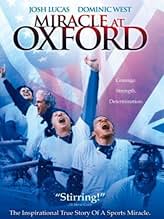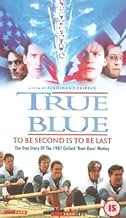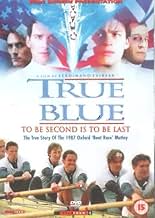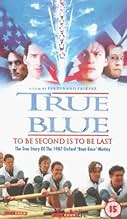Adicionar um enredo no seu idiomaThe story of the year the Oxford and Cambridge boat race changed from a gentleman's race to one where winning was everything.The story of the year the Oxford and Cambridge boat race changed from a gentleman's race to one where winning was everything.The story of the year the Oxford and Cambridge boat race changed from a gentleman's race to one where winning was everything.
- Direção
- Roteiristas
- Artistas
Robert T. Bogue
- Jeff Chambers
- (as Robert Bogue)
- Direção
- Roteiristas
- Elenco e equipe completos
- Produção, bilheteria e muito mais no IMDbPro
Avaliações em destaque
Based on the true story of an American at Oxford swearing to overcome defeat in the 1986 Boat Race (Oxford's first defeat to Cambridge in 11 years) by returning the following year with some international colleagues and the resultant "mutiny" when they refuse to follow the coach's training schedules.
The film is a fictionalised account and comes down firmly (as did the book on which it is based) on the side of chief coach Dan Topolski and OUBC President Donald MacDonald. It's not a half bad attempt at telling a story with a good bash at both trying to underline the importance in the old universities of the boat race and the physical demands the race makes.
The rowing is reasonably portrayed too, using real oarsmen as their opposition and with the actors having been taught to row by Topolski, but sometimes the continuity is lost and there are mistakes aplenty if you really try to go looking for them!
It's not a film that challenges, but it does entertain - although how much it entertains a dry-bob is the big question!
The film is a fictionalised account and comes down firmly (as did the book on which it is based) on the side of chief coach Dan Topolski and OUBC President Donald MacDonald. It's not a half bad attempt at telling a story with a good bash at both trying to underline the importance in the old universities of the boat race and the physical demands the race makes.
The rowing is reasonably portrayed too, using real oarsmen as their opposition and with the actors having been taught to row by Topolski, but sometimes the continuity is lost and there are mistakes aplenty if you really try to go looking for them!
It's not a film that challenges, but it does entertain - although how much it entertains a dry-bob is the big question!
"Aawks-furrd". According to the introductory voice-over, this is where True Blue is set. It seems this was a token attempt not to completely alienate an American audience. For this is a story where poor misguided Oxford rowers draft in wicked Americans to help beat the apparently unstoppable Force Of Nature that is Cambridge University, which has been so unsporting as to actually win the last Boat Race. We are thus drawn into a picturesque but insane world where the motto is "six months' torture for a lifetime's pride". Unfortunately, we have to take part in some of the torture as rowers and coaches bitch at each other about training too much.
If the film could impart some of the ambition and dedication of top athletes to an ideal of winning (as does the book True Blue), then it would be exciting and disturbing. Similarly, if it could give an impression of their personal sacrifices it would remind us of how remarkable the Boat Race actually is in the sport of rowing. Unfortunately, the film falls between the two stools. It fails to show the personal lives of the squad beyond caricatures where bitterness and childish pranks are the norm, and therefore fails to create any sympathy with the characters; yet it also fails to do justice to the sport, showing us actors desperately trying to row as they bat up and down the boat, failing to make any impression on the boat speed except throwing up a lot of water at the camera. Rowing should be a sport that is smooth and beautiful, not rushed and convulsive.
It is only when the film stops using actors and hires real rowers, drops the clunky script (who could forget such lines as "That's unconscionable!"?) and shows us an actual race that the director's skill can come through. He has been spending the rest of the film showing us beautiful but pointless shots of the sun rising over the dreaming spires of Oxford. In this way, the portrayal of the Boat Race itself almost makes up for the excruciating moroseness of the Blue Boat squad that has been flung at us for the last hour.
In the end, if you want to see some nice shots of Oxford, see some well-built rowers in Lycra and hear a pseudo-"Chariots of Fire" soundtrack, you could watch this film. Or you could do a ten-thousand metre work session on a rowing machine, which would be shorter and less painful.
If the film could impart some of the ambition and dedication of top athletes to an ideal of winning (as does the book True Blue), then it would be exciting and disturbing. Similarly, if it could give an impression of their personal sacrifices it would remind us of how remarkable the Boat Race actually is in the sport of rowing. Unfortunately, the film falls between the two stools. It fails to show the personal lives of the squad beyond caricatures where bitterness and childish pranks are the norm, and therefore fails to create any sympathy with the characters; yet it also fails to do justice to the sport, showing us actors desperately trying to row as they bat up and down the boat, failing to make any impression on the boat speed except throwing up a lot of water at the camera. Rowing should be a sport that is smooth and beautiful, not rushed and convulsive.
It is only when the film stops using actors and hires real rowers, drops the clunky script (who could forget such lines as "That's unconscionable!"?) and shows us an actual race that the director's skill can come through. He has been spending the rest of the film showing us beautiful but pointless shots of the sun rising over the dreaming spires of Oxford. In this way, the portrayal of the Boat Race itself almost makes up for the excruciating moroseness of the Blue Boat squad that has been flung at us for the last hour.
In the end, if you want to see some nice shots of Oxford, see some well-built rowers in Lycra and hear a pseudo-"Chariots of Fire" soundtrack, you could watch this film. Or you could do a ten-thousand metre work session on a rowing machine, which would be shorter and less painful.
Rowing is a lot harder and satisfactory than running, and not only because of the physics, but also because of the team building style that can pre-eminently make or break a winning team. 'True Blue' is not a 'Chariots of fire' with it's David Watkin (Catch-22) cinematography and Vangelis (Blade Runner) score, but as I like rowing a lot better than running, this was a good film for me, especially because I started rowing in 1996. The film is not only appealing for the English or Americans, but also for the Dutch. The reason for that might be the Dutch victory in the 1996 Olympic Boat Race (and remember: no points for second place). These 'Holland Acht' guys must have seen this film the day before.
Another good point of this movie is the absence of religious interference with the urge to perform, and the presence of struggle for influence between coaches and rowers. Apart from the infighting that's what is concerning rowers most. 'War is not about who's right, but about who's left (in the boat)'. 'True blue' is definitely more than a simple tv-movie for rowers. Credit to cinematographer Brian Tufano (Shallow Grave, Trainspotting, Quadrophenia, Lords of discipline).
Accordingly, I have to rate both movies 8/10
Another good point of this movie is the absence of religious interference with the urge to perform, and the presence of struggle for influence between coaches and rowers. Apart from the infighting that's what is concerning rowers most. 'War is not about who's right, but about who's left (in the boat)'. 'True blue' is definitely more than a simple tv-movie for rowers. Credit to cinematographer Brian Tufano (Shallow Grave, Trainspotting, Quadrophenia, Lords of discipline).
Accordingly, I have to rate both movies 8/10
Quite definitely the best film ever made about rowing (admittedly out of a poor field of competitors), 'True Blue' vividly conveys the striving for physical perfection and the stress of selection and training for the hardest rowing race in the word. The sheer bloody-mindedness, obstinacy and ambition needed to do well in such a sport spill over into the vicious personal relationships of this story, where the harsh sacrifices made mean that little quarter is given to those with whom you disagree and rival strongly opinionated tribes grow up, all with some right on their side. The bleak mood of the film is set straightaway with the picture of a lonely sculler training on a remote, snow-swept wind-blown loch. The film is visually poetic, using the real and truly beautiful venues used for the training in a matchless mix of colours and varying weather. Fairfax uses a good script, which nonetheless could have done with one more re-write to clarify the large cast of characters involved. The spectator comes away wondering also if some of the film's faults may not be due to back-pedaling over the real details of story to avoid legal action, which led to the changes of name of all but the two main characters. The soaring triumph of the spirit shown the final race in savage racing conditions is well worth waiting for, ably urged on by the sound track music. Some good cameo parts add to the overall pleasure of this film.
Not only is it a poorly told story, with terrible directing and acting as others have pointed out, but the rowing in this movie is actually quite bad. There are a few helicopter/crane shots of actual Cambridge and Oxford crews rowing, but it's obvious that these were taken outside the context of the movie. While the actors seem to have had some coaching and practice before shooting started, it couldn't be more than a few weeks. Their technique is horrendous, even in the Boat Race sequence. For people that speak the language, expect missed catches, washing out, bodies flying everywhere, coxswains yelling "stroke! stroke!" . . . you name it, they mess it up, and all the while the boats are perfectly on keel. Anyone who would be in The Boat Race would look much better than these fools. This movie has been a running joke in boathouses and on rowing message boards for years. If you know anything about what a rowing stroke should look like, how a coxswain calls a race, the etiquette of conversation during a seat race, or the difference between 20 and 35 strokes a minute, you will not be able to keep from laughing at this movie.
Você sabia?
- CuriosidadesThe Cambridge crew in this film were played by members of the rowing squad from Imperial College, London, including several members of the British international squad.
- Erros de gravaçãoThe Cambridge crew used "cleaver" blades, which weren't invented for three years after the film was set.
- Citações
Morrison Black: So tell me something - what is it that makes Topolski such a hot shot?
Nick Bonham: I don't know, I've never understood it... Maybe he's hung like a horse?
- Trilhas sonorasTwo Tribes
Written by Holly Johnson, Mark O'Toole and Peter Gill
Performed by Frankie Goes to Hollywood
Published by Perfect Songs Ltd
Courtesy of ZTT Records and Warner Music UK Ltd
Principais escolhas
Faça login para avaliar e ver a lista de recomendações personalizadas
- How long is True Blue?Fornecido pela Alexa
Detalhes
- Data de lançamento
- País de origem
- Idioma
- Também conhecido como
- Miracle at Oxford
- Locações de filme
- Empresas de produção
- Consulte mais créditos da empresa na IMDbPro
- Tempo de duração
- 1 h 58 min(118 min)
- Cor
- Mixagem de som
- Proporção
- 1.85 : 1
Contribua para esta página
Sugerir uma alteração ou adicionar conteúdo ausente



































